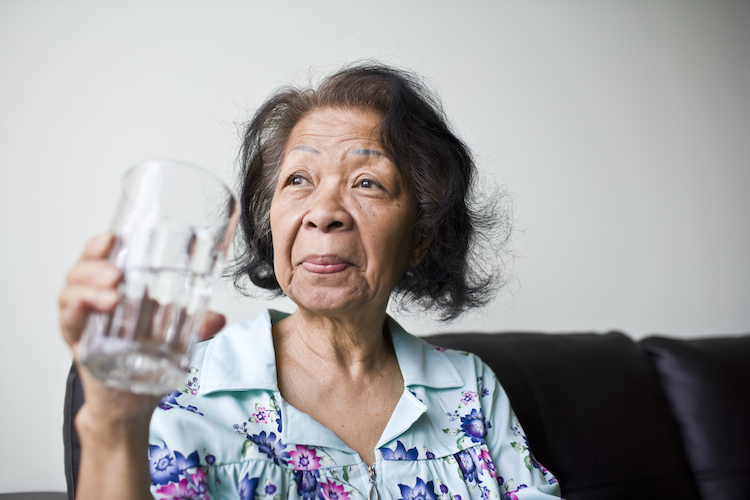
Dehydration in seniors can cause serious health complications.
During the warmest time of year, maintaining correct hydration is essential, particularly for older adults. In fact, close to 1/2 of all older adults are chronically under-hydrated, as shared in a recently available UCLA study, which can result in numerous health risks, including kidney stones, urinary tract infection, and in some cases a greater risk for falls.
The prevalence of dehydration in seniors is related to an assortment of factors, such as:
- A diminished volume of water naturally in aging bodies
- Medication side effects
- Less sensitivity to the sensation of thirst
- A reduced ability to maintain the correct fluid level balance within the body
- Decreased efficiency of the kidneys
- And more
There is a basic calculation to determine just how much water an older adult should drink each day. Take the individual’s body weight in pounds, and drink one-third that many ounces of water each day. Somebody who weighs 120 pounds, for example, ought to drink, at the very least, 40 ounces of water – about five 8-ounce glasses.
Time is of the essence in ensuring hydration in seniors, as it’s much easier to fix mild dehydration prior to it becoming to be more severe. Symptoms include:
Mild Dehydration:
- Decreased, darker-colored urine
- Dry mouth
- Dizziness and fatigue
- Muscle cramping
- Irritability
- Headaches
Severe Dehydration:
- Disorientation and confusion
- Trouble walking
- Weak, fast pulse
- Low blood pressure levels
- Intensifying of muscle cramps
- Sunken, dry eyes
- Skin that is wrinkled and has reduced elasticity
- Bloating
- Quickened breathing
- Convulsions
Obtain medical attention as soon as possible should you suspect dehydration in an older adult, to prevent significant health complications which may develop rapidly.
If a senior loved one resists drinking enough water, try flavoring the water or offering juice, if it is an acceptable part of the older adult’s dietary plan. For anyone with conditions such as diabetes or obesity, the sugar content in juice could be harmful. Sometimes, adjusting the temperature of the beverage will make it more pleasing as well, such as heating a cup of water with some lemon to sip on each morning, and then offering cold water over crushed ice in the afternoon.
The important thing is always to have fluids readily available throughout during the day. Geriatric nurse Anne Vanderbilt, CNS, explains, “What I often see in our advanced older adults – people in their 80s and 90s – is that they can’t sit down and drink a full 8-ounce glass of water. It fills them up, causes bloating and then makes them have to run to the bathroom. So little sips throughout the day are better.”
In order to help make sure the seniors you love are remaining hydrated and healthy, partner with Morning Glory Home Care for high quality home health care in Granite City, IL and the surrounding areas. Our caregivers are readily available to help monitor fluid intake, prepare healthy and balanced meals, motivate seniors to continue to be physically active, and more for optimal health. Reach out to us at 618-667-8400 for a free in-home assessment and to learn more about our exceptional home health care in Granite City, IL and the surrounding communities.
